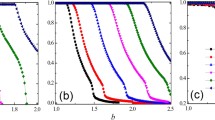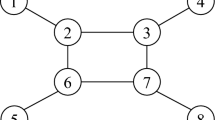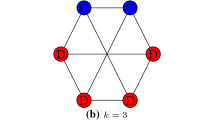Abstract
Many incentive mechanisms have been proposed to encourage cooperation among agents in autonomous networks, but the altruism attribute of agents is considered very few in such mechanisms. In this paper, we introduce other-regarding preference (ORP) and fitness factor 𝜃 into incentive mechanism to more realistically characterize the altruism of agents. In our proposed mechanism, an agent’s fitness is composed of its own payoff and its neighbors’ payoffs. While making a strategy update, the agent not only considers its own benefits but also its opponents’ benefits. The payoffs of its neighbors are proportional to the fitness factor 𝜃. Through mathematical analysis and experiments, we find that adding ORP in a well-mixed population may not change the evolution result, but it may slow the evolution and enable cooperators survive longer in the system. In structured networks, ORP together with the structure of the network can help agents with the same strategy form a cluster, thus promoting cooperation in the system.








Similar content being viewed by others
References
Nakao A (2010) Psychological research and application in autonomous networks and systems: A new interesting field. In: Proceedings 2010 International Conference on Intelligent Computing and Integrated Systems, pp 568–572
Scekic O, Truong HL, Dustdar S (2013) Incentives and rewarding in social computing. Commun ACM 56(6):72–82
Nowak MA (2012) Evolving cooperation. J Theor Biol 299(4):18
Zhang K, Antonopoulos N, Mahmood Z (2009) A review of incentive mechanism in peer-to-peer systems. In: International Conference on Advances in P2P Systems, pp 45–50
Nowak MA, Sigmund K (1998) Evolution of indirect reciprocity by image scoring. Nature 393(6685):573–577
Zhao BQ, Lui JCS, Chiu DM (2012) A mathematical framework for analyzing adaptive incentive protocols in p2p networks. IEEE/ACM Trans Netw 20(2):367–380
Feldman M, Lai K, Stoica I, Chuang J (2004) Robust incentive techniques 385 for peer-to-peer networks. Proceedings of ACM Conference Electronic Commerce ACM Press, pp 264–267
Ma RTB, Lee SCM, Lui JCS, Yau DKY (2006) Incentive and service differentiation in p2p networks : A game theoretic approach. IEEE/ACM Trans Netw 14(5):978–991
Palomar E, Alcaide A, Ribagorda A, Zhang Y (2012) The peers dilemma: a general framework to examine cooperation in pure peer-to-peer systems. Comput Netw Int J Comput Telecommun Netw 56(17):3756–3766
Mejia M, Pea N, Muoz JL, Esparza O, Alzate MA (2011) A game theoretic trust model for on-line distributed evolution of cooperation inmanets. J Netw Comput Appl 34(1):39–51
Somani AK, Gupta R (2005) Game theory as a tool to strategize as well as 395 predict nodes behavior in peer-to-peer networks. In: ICPADS, pp 244–249
Li Z, Shen H (2011) Game-theoretic analysis of cooperation incentive strategies in mobile ad hoc networks. IEEE Trans Mob Comput 11(8):1287–1303
Luo T, Tan H-P, Xia L (2014) Profit-maximizing incentive for participatory sensing. In: INFOCOM, 2014 Proceedings IEEE. IEEE, pp 127–135
Buragohain C, Agrawal D, Suri S (2003) A game theoretic framework for incentives in p2p systems. In: Third International Conference on Peer-to-Peer Computing, 2003. (P2P 2003). Proceedings, pp 48–56
Wang Y, Nakao A, Vasilakos AV, Ma J, soft security P 2P (2011) On evolutionary dynamics of P2P incentive mechanism. Comput Commun 34(3):241–249
Liu Y, Zhang J, An B, Sen S (2015) A simulation framework for measuring robustness of incentive mechanisms and its implementation in reputation systems. Autonomous Agents and Multi-Agent Systems, pp 1–20
Cui G, Li M, Wang Z, Ren J, Jiao D, Ma J Analysis and evaluation of incentive mechanisms in p2p networks: a spatial evolutionary game theory perspective, Concurrency and Computation Practice & Experience
Brodbeck FC, Kugler KG, Reif JA, Ma M (2013) Morals matter in economic games. Plos One 8 (12):e81558
Golle P, Leyton-Brown K, Mironov I, Lillibridge M (2001) Incentives for sharing in peer-to-peer networks electronic commerce
Vassilakis DK, Vassalos V (2009) An analysis of peer-to-peer networks with altruistic peers. Peer-to-Peer Netw Appl 2(2):109–127
Chu YH (2004) Considering altruism in peer-to-peer internet streaming broadcast, Proceedings of ACM Nossdav, pp 10–15
Lv Y, Moscibroda T (2015) Incentive networks. In: Twenty-ninth AAAI Conference. Association for the Advancement of Artificial Intelligence, Austin, USA, pp 25–30
Wang Z, Du WB, Cao XB, Zhang LZ (2010) Integrating neighborhoods in the evaluation of fitness promotes cooperation in the spatial prisoners dilemma game. Phys Stat Mech Appl 390:1234–1239
Wang Z, Murks A, Du WB, Rong ZH, Perc M (2011) Coveting thy neighbors fitness as a means to resolve social dilemmas. J Theor Biol 277(1):19–26
Szabo G, Szolnoki A (2011) Selfishness, fraternity, and other-regarding preference in spatial evolutionary games. J Theor Biol 299(4):81–87
Lu K, Wu B, Li MC, Wang Z (2014) Other-regarding preference causing ping-pong effect in self-questioning game. Chaos Solitons Fractals 59(2):51–58
Wong EL, Leners JB, Alvisi L (2010) It’s on me! the benefit of altruism in bar environments. Lecture Notes in Computer Science, pp 406–420
Haddi FL, Benchaiba M A survey of incentive mechanisms in static and mobile P2P systems. Journal of Network and Computer Applications
Antonioni A, Tomassini M (2011) Network fluctuations hinder cooperation in evolutionary games. PloS one 6(10):e25555–e25555
Xia C, Wang J, Wang L, Sun S, Sun J, Wang J (2012) Role of update dynamics in the collective cooperation on the spatial snowdrift games: Beyond unconditional imitation and replicator dynamics. Chaos, Solitons Fractals 45(9):1239–1245
Mao Y, Zhu P, Wei G (2013) A game theoretic model for wireless sensor networks with hidden-action attacks. International Journal of Distributed Sensor Networks
Tang C, Li A, Li X When reputation enforces evolutionary cooperation in unreliable manets. IEEE transactions on cybernetics
Hofbauer J, Sigmund K (1998) Evolutionary games and population dynamics. In: 35 - Larrick, pp 2565–2570
Ohtsuki H, Nowak MA (2006) The replicator equation on graphs. Journal of theoretical biology 243 (1):86–97
Watts DJ, Sh S (1998) Collective dynamics of small-world networks. Nature 6684(6684):440–442
Hein DIO, Schwind D. WIM, Konig W (2006) Scale-free networks. Wirtschaftsinformatik 48(4):267–275
Acknowledgments
This paper is supported by the National Science Foundation of China under grant No. 61272173, 61403059, 61572095.
Author information
Authors and Affiliations
Corresponding author
Rights and permissions
About this article
Cite this article
Lu, K., Wang, S., Xie, L. et al. Modeling altruism agents: Incentive mechanism in autonomous networks with other-regarding preference. Peer-to-Peer Netw. Appl. 10, 1169–1181 (2017). https://doi.org/10.1007/s12083-016-0470-3
Received:
Accepted:
Published:
Issue Date:
DOI: https://doi.org/10.1007/s12083-016-0470-3




